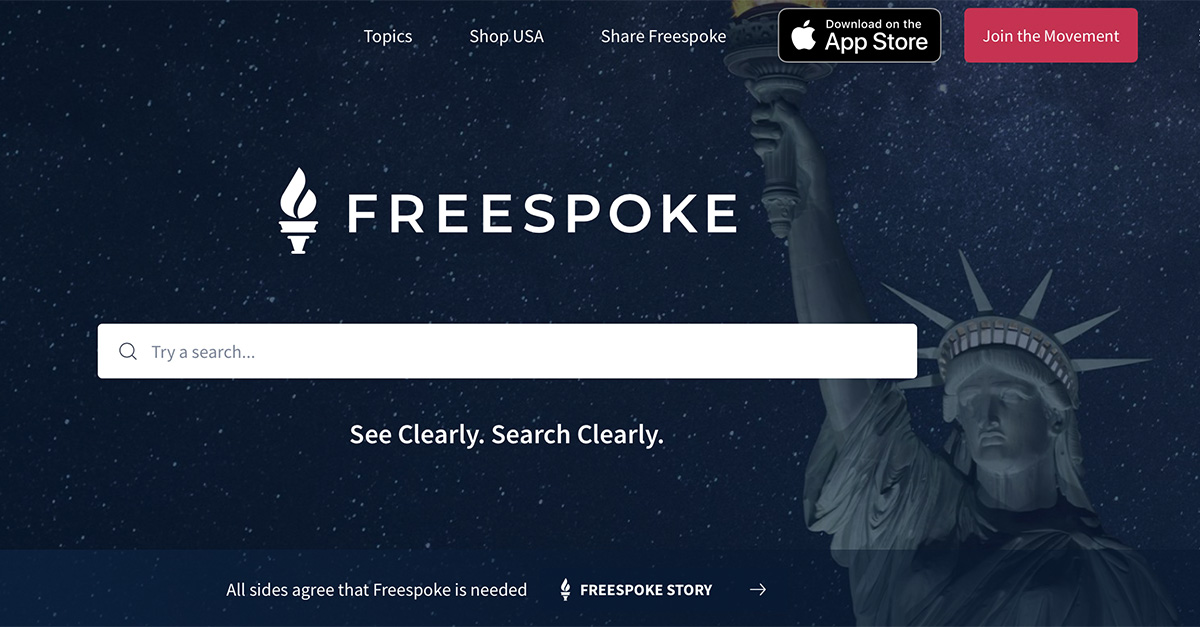


Get a free copy of Parental Rights & Education when you subscribe to our newsletter!

“It comes back to putting information in front of people and helping them come to their own conclusions. And it’s really something that just seems to be outside of what the Big Tech world is thinking right now, where they want to guide your thinking.”
– TODD RICKETTS, FOUNDER, FREESPOKE
As Big Tech companies continue to censor voices, opinions, and facts they don’t like while some lawmakers call for those same companies to manipulate search results, there is clearly the need for an Internet search engine built on neutrality.
That’s where Freespoke comes in. Todd Ricketts, co-owner of the Chicago Cubs, launched the new search engine because he noticed that when he did a Google search, the results he got back weren’t what he expected.
“I felt like they were a little bit left-leaning, that they were not showing everything that I was looking for, really, and trying to guide me down a path that was not the path I was looking for,” he said in an interview with the Daily Signal.
Ricketts, 52, who was the national finance chairman for the Republican National Committee (RNC), noted that in 2020, 80 percent of RNC emails sent to Gmail accounts went directly to the spam folder compared to less than 10 percent of emails from the Democrat National Committee (DNC).
He said that was just “one insight into how Google thinks about conservative views and conservative values.” Another was COVID, in which Google suppressed “information on people who just questioned what the [Centers for Disease Control and Prevention] was saying and questioned: Were lockdowns and masks and all these things we did, were they the right thing? And so, if you said that, you were immediately taken off of YouTube or taken down from a Google search,” Ricketts said.
In light of this, the goal of a new search engine is “to help people sort through” the reams of news articles, features stories, and opinion pieces that are out there. “Again, it comes back to putting information in front of people and helping them come to their own conclusions,” he said. “And it’s really something that just seems to be outside of what the Big Tech world is thinking right now, where they want to guide your thinking.”
Freespoke, unlike many search engines, doesn’t censor results. In fact, it even contains a section called “Censored Stories” for “stories the media doesn’t want you to see.” Freespoke also has a crawler that continually searches for new content and highlights those items. “If you go look for news on Google, you’ll find the New York Times pays for that first slot all the time. And so, we avoid having that by not having people pay for that slot.”
He explained, “We’re trying to put content up as it is relevant, not as it’s paid for.”
Another key feature of Freespoke is its labeling of sources as “left,” “middle,” or “right” to help searchers understand any bias that may be a part of each source’s reporting on a topic. What’s more, the search engine’s trending story sections feature articles written by sources of all viewpoints.
Media outlets that have long been considered “mainstream” don’t automatically receive a “middle” labeling from Freespoke. Legacy media like the Washington Post, the New York Times, CBS News, USA Today, and CNBC received “left” labels. Outlets like Reuters, The Hill, and Politico were given “middle” labels, while the New York Post, Washington Examiner, Fox News, and Breitbart received “right” labels.
Ricketts stated that a couple of outlets have said they want to be labeled as “middle.” However, he explained, “We’re going to continue to do it our way.”
Freespoke looks at several sources to help accurately label the point of view of media outlets, including Fontes — an organization that identifies content as “left,” “right,” and “center” thinking. In addition, Ricketts said, Freespoke looks at the sites, “identifying language that is either left or right,” noting that “we’re going to continue to label things to the best of our ability and as clearly as possible.”
Ricketts said that the designations help searchers know “who wrote that, where they’re coming from, and their point of view, and what they might have written before. It’s just trying to help people sort through all the information that’s out there, and, again, it’s all about coming to your own conclusions, finding the information, [and] educating yourself.”
Of the left’s fight to stop so-called “misinformation,” Ricketts said, “It goes back to that old saying: ‘One man’s terrorist is another man’s freedom fighter.’ And so, when you get into this world of what you consider misinformation, it’s a little scary to think that there’s some 25-year-old kid in Silicon Valley that gets to decide that.”
Ricketts also said that the efforts by Democratic legislators to urge Google to censor crisis pregnancy centers are also “scary.”
He added, “It’s dangerous when you get into a situation where … an administration and Democratic politicians along with the media, and along with Big Tech are trying to suppress the free flow of ideas. That’s not the United States of America; that looks something that’s more akin to like what you would expect in Russia or China.”

America is in desperate need of a competitor to the major tech companies, particularly Google, which dominates the Internet search market. Tech companies are manipulating or outright banning articles and results that differ with the left’s views on abortion, climate change, COVID mitigation measures, vaccine safety, LGBT issues, and more. As tech companies ratchet up their role as a propaganda machine for the left, an unbiased search engine is necessary for Americans to make informed decisions.
Freespoke’s labeling feature should be welcomed by all as its designations are far more accurate than those search engines that consider mainstream outlets to be neutral. The results do place more weight on Freespoke’s view of an outlet’s bias, which could cause users to either ignore right or left outlets or place too much faith in a “middle” designation. For example, one could certainly make the argument that Politico, which published the leaked draft of the Supreme Court’s opinion in Dobbs v. Jackson, leans left. However, the positioning of three articles side by side can immediately help searchers see how news is presented, so at least they are aware that not everyone sees the same issue or even the same set of facts in the same way.
Ultimately, Freespoke is a great tool for Americans who need alternatives to Big Tech companies that care more about their own political motives than about what is best for their users. Trusting Americans to make the best decisions about issues that affect their families, communities, and country is a vastly superior option to forcing people to adopt the viewpoint of the powerful.
Proverbs 24:28 says, “Do not be a witness against your neighbor without cause, and do not deceive with your lips.” By manipulating what Americans see, tech companies are deceiving them. Not only that but by advancing content that portrays conservative Americans as racists, bigots, and other negative stereotypes while trying to silence them rather than allowing people to see conservatives as people and hear their views, Big Tech companies paint a harsh picture. Moreover, by denying users the right to engage with those who have opposing views, ideological opponents are viewed as “others” rather than fellow Americans. We’ve seen this type of division play out in history too many times to know that it doesn’t end well — for anyone.
Bravo to Todd Ricketts for stepping forward in the tradition of the First Amendment to create a search engine that provides more information, not less, and more viewpoints, not fewer — so Americans can fully understand issues affecting their lives and country and come to their own conclusions.
Ready to dive deeper into the intersection of faith and policy? Head over to our Theology of Politics series page where we’ve published several long-form pieces that will help Christians navigate where their faith should direct them on political issues.

Notifications